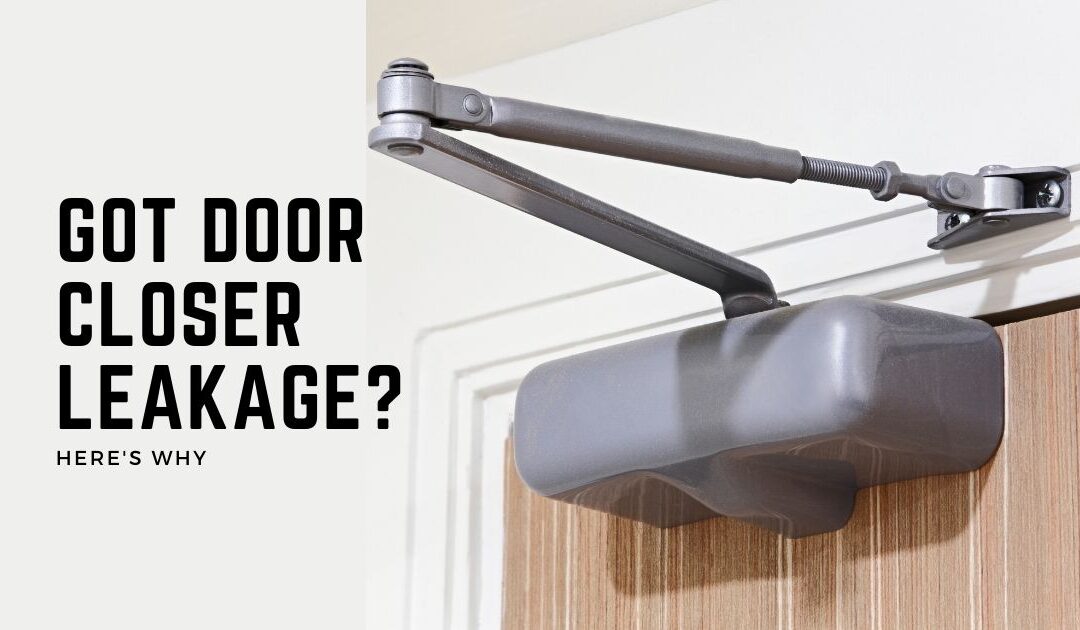Door closers are vital components that ensure doors are closed properly at all times. They prevent doors from slamming, help maintain the space’s peace, and keep people safe from door-related injuries.
There are occasions when the main components of a door closer begin leaking fluid. Although the leak is not as strong as a tap’s water flowing, the slow trickle of liquid is noticeable, especially when using the door more than usual.
What causes door closers to leak, and when should you call for door repair services? This article will answer those questions and more today.
Door Closer Leak Causes
Often, door closer leaks stem from two things: o-ring malfunctions and cylinder cracks. There are various reasons why these problems occur. Here are some of them:
- Extreme Door Use
One common reason why door closers leak is overuse. The closer’s o-ring seal gets exposed when people use the door excessively. It eventually wears down the door’s mechanisms and loosens the oil seal. The seal slowly breaks, and oil leaks from it.
2. Wrong Dynamic Seal Surface
Abrasion is another common cause of o-ring malfunctions. Closers with dynamic seals often have this problem. O-ring malfunctions from abrasions happen when the dynamic seal’s surface has an incorrect finish.
If it is too smooth, the lubricant will stick to it. If it is too rough or too abrasive, it can damage or even destroy the o-ring. When the o-ring breaks, leakage is inevitable.
3. Faulty Door Closer Installation
Improper door closer installation can cause o-ring malfunctions that lead to leaks. Not making sure that the o-ring gland, or the rod where the o-ring passes through, is clean can cause malfunctions.
Small metal particles can contaminate the mechanism, leading to leaks and other issues. Failing to check if the grooves in the o-ring mechanism are smooth can also cause problems. The sharp groove walls can hinder the o-ring motion and ultimately cause it to fail.
4. Too Much Pressure in the Cylinder
Cracks in the door closer’s cylinder body can cause oil to seep out from the mechanism. Excessive use can lead to pressure buildup inside the system, but the most common cause of this is incorrect installation.
The building pressure can reach a point where it cracks the body. These cracks are barely visible to the naked eye, making the leak seem to appear out of nowhere.
5. Presence of Rust and Corrosion
When you install door closers for outdoor purposes, varying weather conditions cause them to rust quicker. Rust will affect the door’s function closer and lead to oil leakage.
Door Closer Leak Solutions
When door closers malfunction, repairing them is possible. But fixing door closer leaks is another issue altogether.
Since the oil leaks involve the o-ring malfunctions and cylinder damage, the best solution is to replace the whole mechanism. These two issues are integral parts of the system that are often closed-off from the rest of the door closer parts.
Repairing them would be challenging, to say the least. That is why when you see signs of your door closers leaking, call a company offering door closer services. They can identify the problem and find the right solution for the issue.
Conclusion
Now that you have a better understanding of what causes oil leakage from a door closer, you should have no problem avoiding it in the future. But when leaks do occur, it is best to call for professional door repair services to prevent possible hazards. If you are looking for top-notch door closer service in Cincinnati, Allied Lock and Door is at your service. We are a BBB-accredited company that can handle a wide range of services, including door closer installations, replacements, and more. Contact us today to learn more about how we can help you!

